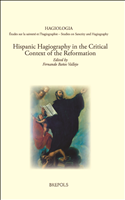2023 - Brepols
E-book
Digital Version
Download | Copy/paste | Printing
Hispanic Hagiography in the Critical Context of the Reformation
267 p.
- The sixteenth century was a time of great religious turmoil in Europe, during which the critical positions within the Catholic Church led to a definitive break between Christians. One of the major controversies pertained to the cult of the saints, since in 1523 Martin Luther denied the mediating role of the saints and repudiated what he considered excesses in their devotions.The studies presented in this volume examine the impact of the Reformation on hagiography in the Hispanic sphere. They investigate how theological positions and controversy were projected onto literature, and how literature incorporated theological discourse, explicitly or implicitly. Unsurprisingly, the Catholic Church reaffirmed the hagiographical tradition, but to what extent was hagiographical literature, specifically Hispanic literature, affected by reformist approaches? This book explores issues less evident and hitherto neglected: for example, Hispanic Catholic authorities and authors, influenced by the denunciations of the excesse
- s of the cult of saints and hagiographical ''fables,'' publicly declared the purging of apocryphal elements in saints' lives; in practice, however, they grappled with the difficulty of applying theoretical criteria to such an enormous subject. As a result, certain contradictions arose between these criteria and the commitment to the hagiographical tradition, which some even sought to expand and update. This complex tension is brought out by the studies gathered here in the fields of hagiographical prose in Catalan, Portuguese and Spanish, in Iberia and in America, without neglecting the role of the theater in the dissemination of saints' legends. [Publisher's text].
- Special access authorizations may apply; please contact us for further information.
-
Information


